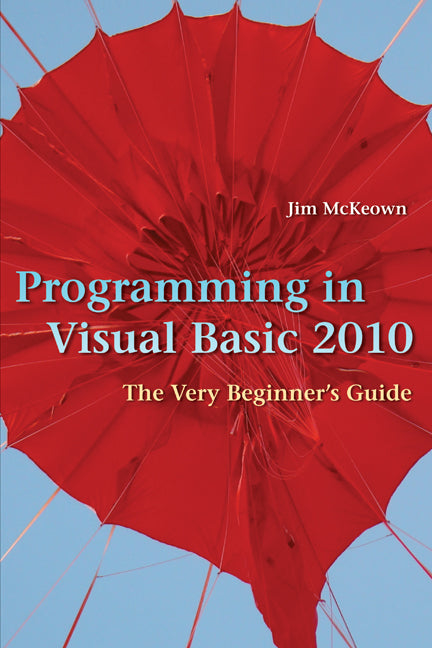Freshly Printed - allow 4 days lead
Couldn't load pickup availability
Programming in Visual Basic 2010
The Very Beginner's Guide
An introduction to programming using Microsoft's Visual Basic.NET 2010 for anyone with little or no programming experience.
Jim McKeown (Author)
9780521721110, Cambridge University Press
Paperback, published 29 March 2010
784 pages, 234 b/w illus. 36 tables 376 exercises
25.4 x 17.7 x 3.7 cm, 1.2 kg
'This book provides a great overview of the subject of VB.NET programming. It covers all the important topics in detail and offers plenty of opportunities for readers to try exercises on their own. There are also lots of useful asides that the readers will find interesting; the use of humor keeps the writing engaging and fun. Detailed problems and debugging walkthroughs, which are both thought provoking and complex, assist with the coverage of useful topics such as object-oriented programming, complex data structures, drag-and-drop design, and event handling.' Rudy McDaniel, University of Central Florida
This is an introduction to programming using Microsoft's Visual Basic.NET 2010, intended for novice programmers with little or no programming experience or no experience with Visual Basic. The text emphasizes programming logic and good programming techniques with generous explanations of programming concepts written from a non-technical point of view. It stresses input, processing, and output and sequence, selection, and repetition in code development. File I/O and arrays are included. Later chapters introduce objects, event programming, and databases. By taking a slow and steady approach to programming ideas, this book builds new concepts from what the reader has already learned. VB tips and quips inject both humor and insight. The book includes numerous programming examples and exercises, case studies, tutorials, and 'fixing a program' sections for an in-depth look at programming problems and tools. Quizzes and review questions throughout each chapter get students to think about the materials and how to use them. Each chapter has a summary and glossary for extra review. The accompanying website, www.cambridge.org/us/McKeown, has code downloads, I/O, and database files from small, simple files to large files with thousands of records, flowcharts, deskchecks and audits to aid with program design, coding, and debugging; PowerPoint files for every chapter; and hundreds of ideas for programs and projects.
1. Fundamentals of design and programming - starting from scratch
2. Variable and constants - a place for everything and everything in its place
3. Writing programs - first you walk, then you run
4. Writing programs II - more controls and new logic
5. Using if and case - decisions, decisions, decisions
6. Loops - once is not enough
7. Procedures and functions - divide and conquer
8. Writing programs III - tying it all together, so far
9. File i/o - files and records and fields, oh my!
10. Arrays and structures - organizing data
11. Events and more controls - tips and tricks for programming
12. Objects and classes - objects are in a class by themselves
13. Graphics - the visual (and audio) side of Visual Basic
14. LINQ to SQL - the world runs on databases
15. Crystal reports - tying databases to output.
Subject Areas: .Net programming [UMPN], Microsoft programming [UMP]


